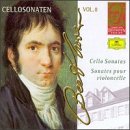| All Artists: Beethoven, Maisky Title: Complete Beethoven Edition, Vol. 8: Cello Sonatas Members Wishing: 1 Total Copies: 0 Label: Deutsche Grammophon Release Date: 11/25/1997 Genre: Classical Styles: Chamber Music, Historical Periods, Classical (c.1770-1830), Instruments, Strings Number of Discs: 2 SwapaCD Credits: 2 UPC: 028945374826 |
Search - Beethoven, Maisky :: Complete Beethoven Edition, Vol. 8: Cello Sonatas
 | Beethoven, Maisky Complete Beethoven Edition, Vol. 8: Cello Sonatas Genre: Classical
|
Larger Image |
CD DetailsSimilar CDs |
CD ReviewsFiery rendition of the sonatas kv581 | Durham, NC United States | 10/15/2000 (5 out of 5 stars) "The performances here are first rate. While they do not surpass the classic Richter/Rostropovich recordings, they nevertheless a offer a distinctive view of these beautiful sonatas. Like the Richter/Rostropovich collaboration, the Argerich/Maisky team is one of equal partnership (though with a slight but noticable nod to the pianist). In fact, sometimes Argerich seems to even dominate and lead the music, which, with a musician of her caliber, isn't necessarily a bad thing. As is with much of Argerich's performances, the music here is intense and driven. For those who own the Argerich/Kremer set of Beethoven violin sonatas, you will certainly hear many stylistic similarities. Oh, and don't forget the three variations (basically encores) included here. They are very pleasant as well. Recommended." Hat Trick Dennis Davis | Peoria, IL USA | 05/08/2001 (5 out of 5 stars) "The thing about Beethoven's chamber music is that he often "pretends" he's writing for orchestra. This is nowhere more evident than in the cello sonatas, in which the cello may be both a solo instrument and the bass line of the orchestral texture, and the piano may be a solo instrument or provide the inner voices of the orchesral texture-and, of course, Beethoven calls on both performers to wear both hats, and to alternate between them frequently, sometimes within the space of a single measure. Apart from the individual mastery of both these performers, the reason why this recording is so successful is that Argerich and Maisky do such an excellent and intelligent job of changing hats as the music requires. It is a beautiful and wonderfully engaging performance, of such interpretive richness that you're guaranteed to hear more every time you listen to it. And, of course, nobody can touch the mellifluous lushness of Maisky's tone." Fiery, Splendid Performances Of Beethoven's Cello Sonatas John Kwok | New York, NY USA | 12/14/2001 (5 out of 5 stars) "Since I haven't heard the legendary recordings with Richter and Rostropovich, I can't compare their traversal of Beethoven's cello sonatas with Argerich's and Maisky's. Yet I think this is one of the most exciting recordings of Beethoven's chamber music I've heard, notable for Argerich's dramatic playing. Yet Maisky comes across as a skillful interpreter of his own, not once taking a back seat to Argerich's keyboard pyrotechnics. Instead, what you have hear is a splendid collaboration between equally gifted musicians, in which one occasionally takes the lead. There is clearly an atmosphere of familiarity, warmth, and indeed, friendship, in their playing. These fine performances are enhanced by Deutsche Grammophon's state-of-the-art digital recording."
|

 Track Listings (28) - Disc #1
Track Listings (28) - Disc #1